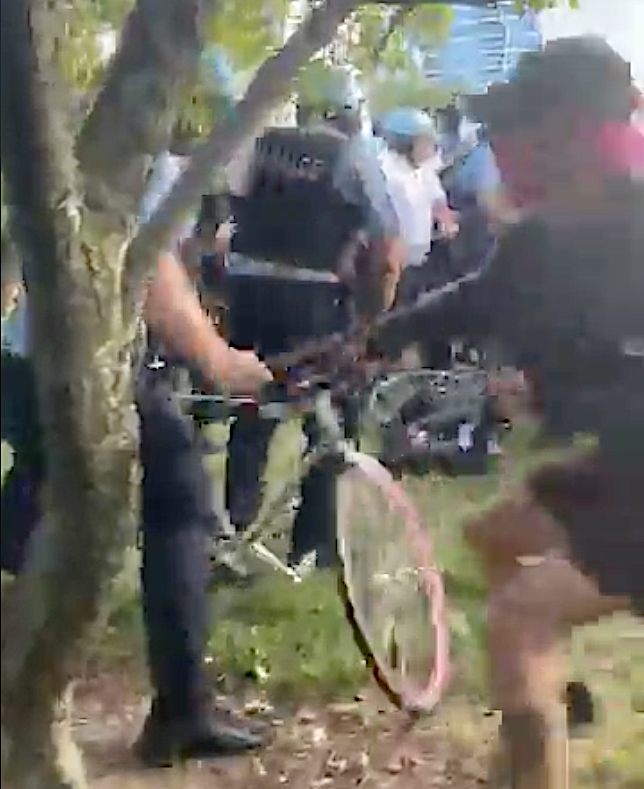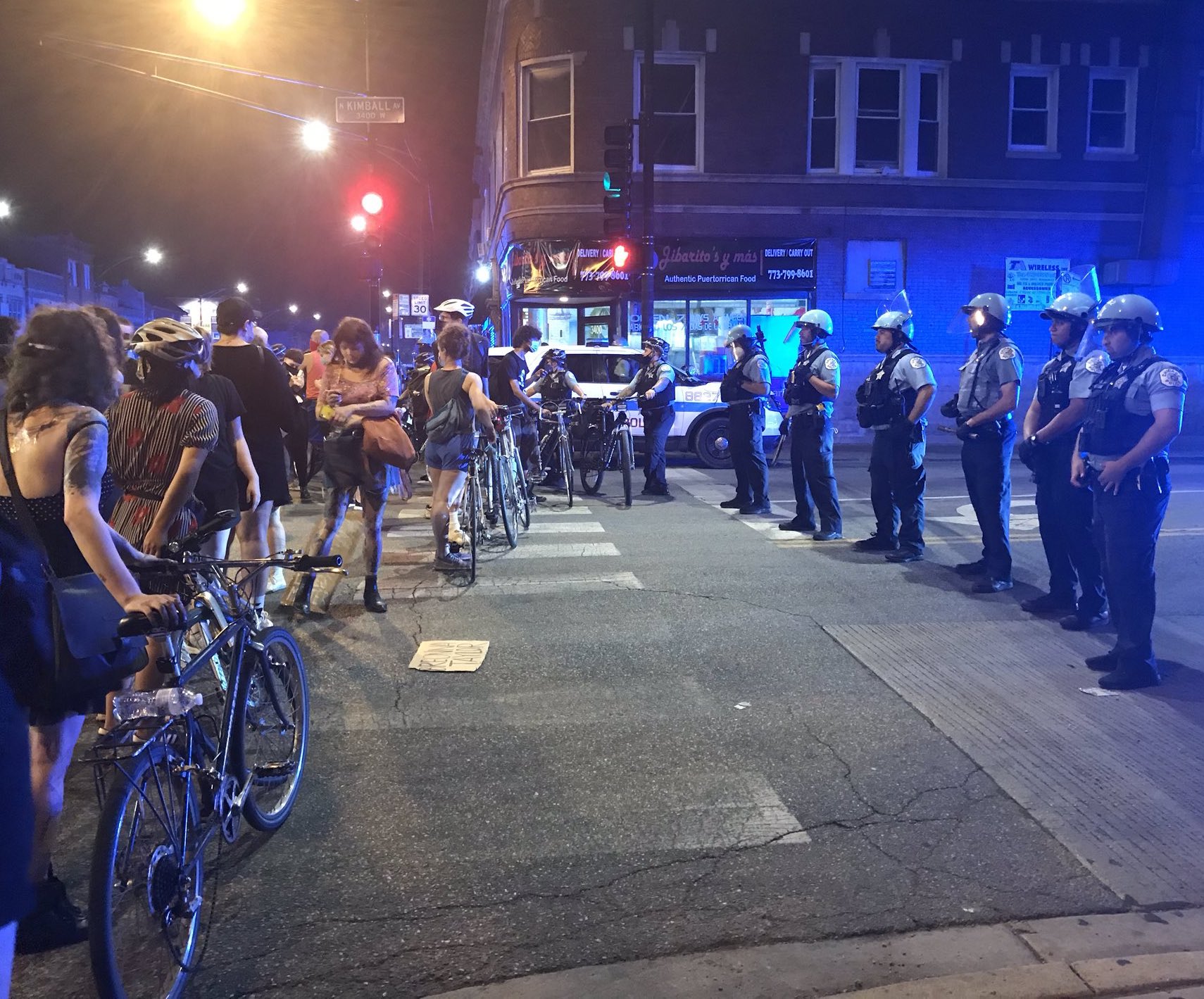Bicycles have played a prominent role at recent social justice demonstrations in Chicago, with protesters known as "bike marshals" using their cycles to create a barricade to separate participants from the police. There have also been incidents of officers using bicycles as weapons, striking demonstrators with them.
During Friday's protest at the downtown Columbus statue, which involved violent clashes between officers and demonstrators, police officers seized dozens of cycles, including those belonging to bike marshals, along with rollerblades, bags, and other personal items. In the wake of these confiscations, bike community members stepped up to help the marshals who lost their wheels, many of whom rely on their bike as their main form of transportation.
My two daughters were pepper sprayed tonight and had their bike, roller skates and bag (w/wallet and ID) taken by @Chicago_Police. (I *guess* thank goodness they weren't beaten/arrested?) Cops/311/911 are giving no info on how to get our stuff back. https://t.co/H7781pefpX
— Linda Lutton ~sabbaticaling thru Aug 2023 (@lindalutton) July 18, 2020
Protest organizers and members of the bike community organized several fundraisers for the marshals on the front lines. The Chicago Bike Marshal Fund exceeded its funding goal and will be donating additional money raised to local causes supporting BIPOC (Black, Indigenous, and people of color) communities.
One marshal who started the fund, who requested anonymity for fear of reprisals from the police, called the support "beautiful." "Once I saw my marshals get their bikes taken away we knew we had to fundraise for them,” she said, though she declined to say how much was raised, citing legal concerns.
Other organizers and cyclists created the Chicago Bike Protest Fund Saturday and raised over $80,000 in three days, an organizer told Streetsblog. “We have received dozens of offers of bikes [and] many offers for volunteer mechanics,” he wrote. “We have also received over 100 requests for bikes or repairs and are still receiving them.” He added that the group is planning a bike repair and donation event, and is working on longer-term plans to train, equip, and organize bike marshals.

A bike marshal from Friday's protest, who also asked to remain anonymous, said he remembers police “ripping people’s bikes away from their hands” at around 7:15 p.m. He said his entire bike was not confiscated, but his front wheel was taken.
The bike marshal said during Friday's clashes, police wielding batons hit him on the head and shoulder, but he was able to hold onto his bike. He added that he saw another cycle seemingly abandoned in the park, so held onto it in hopes of reuniting it with its owner. Almost two hours later when he was biking to give the second bike back to the marshal who’d lost it, police stopped him at Columbus and Balbo and took the second bike, threatening to arrest him if he didn't leave the scene, he said.
The bike marshal said he is not surprised to see the support the marshals received over the weekend because of Chicago's strong cycling community. However, he said, “I was moved by how quickly people mobilized and how quickly the goal was able to be met and exceeded,."
Local teacher Kerry Dolan donated two bikes to marshals who had theirs seized. After hearing the news, she posted a call to Twitter offering two old bikes her family had as a way to support the cause and lend a hand to those who need bikes for transportation. Within a day, two grateful people picked them up, she said.
“I believe that small actions can have a large impact," Dolan said. "Much of my activism takes shape in my work as an educator. I am surrounded, literally, by young people, mostly young Black people, daily. When I see violence inflicted on young activists, I see my own students. I see my daughter. I see my partner. So when I saw that people's bikes were being seized and destroyed, I knew there was at least something small I could do.”
Another protester, who requested anonymity, was at Friday’s demonstration on foot, and served as a bike marshal at a Saturday night protest in the Loop. She said protecting other protesters is her way of being part of the movement. “I definitely don't feel safe, but that's part of the point of it all — to put myself on the line in front of people more vulnerable than I am, and to use my bike as a defense if necessary,” she said. “I feel like I'm doing something important, and I feel like it's the best way to lend my skills to the protests aside from filming and documenting.”
I’m at the protest (and dance) gathering close to Lifhtfoot’s house at Kimball and Wrightwood in Logan Square. #ChicagoProtests pic.twitter.com/oeKDOJaIv4
— Ariel Parrella (@ArielParrella) July 19, 2020
On Saturday hundreds also gathered in Logan Square near Mayor Lori Lightfoot's house for a BIPOC Solidarity Rally to demand that Lightfoot end police brutality against protesters, enact full remote learning in the fall rather than reopening schools, and end the Chicago Public Schools security contract with the Chicago Police Department. (The CPD has released a video that it claims shows a subgroup of people from Friday's protest making a premeditated, unprovoked attack on officers at the statue.) On the frontlines of Saturday's protest, protecting the crowd of people at Fullerton and Kimball avenues with a bike barricade, were dozens of bike marshals.
“One of the main things we need to understand as organizers is that there is space for everyone in the revolution,” said Diego Garcia, who participated in Saturday’s rally and has helped organize other actions. “Being surrounded by allies and marshals at actions, like the one we had on Fullerton and Kimball, is proof that everyone holds a different amount of privilege in our current society.”
Garcia, who stood and chanted with the other organizers and protesters in the circle created by the marshals for the five-hour rally, said these efforts to support Black liberation, especially from non-Black folks, is imperative. “It is crucial to take whatever steps are needed to keep each other safe at these actions, even if it means raising funds to buy bikes for those who are willing to directly put their bodies in between police officers and Black folks,” he said.
Another bike marshal who was at Saturday's rally said, “We are not there to cause trouble or fight the police or push the police back; we are there to stand as a barrier to protect our community members. It is a great message of unity.”




